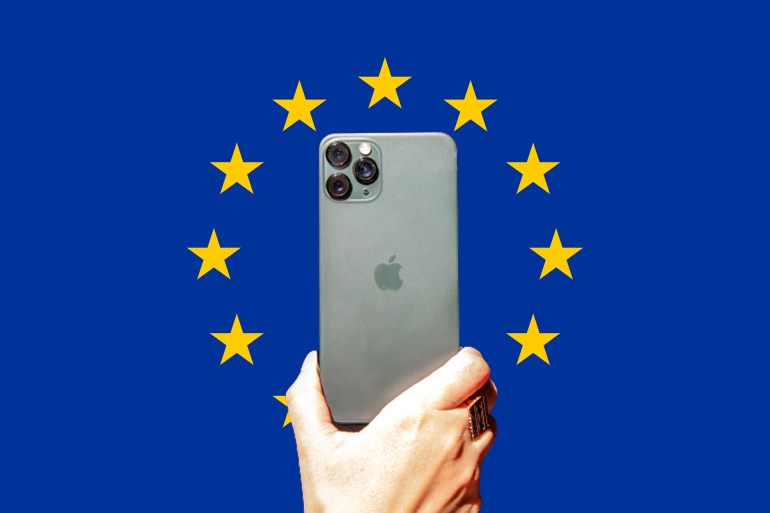Amazon has received an impressive blow in the European arena after Italian courts imposed a huge antitrust fine against the giant, amounting to 1.1 billion euros, last Thursday, for misusing its dominance in the market.
European Union lawmakers have made a real breakthrough in how to target big tech companies, including Google and Apple, as part of Brussels' moves to curb antitrust practices, the Financial newspaper reported. The Financial Times finally.
The Italian punishment comes after a series of strikes suffered by American technology giants in Europe in the past few months, and in general, the European Union countries accuse American technology giants such as Google, Apple, Facebook, Amazon and Microsoft of 5 major charges. They are: not paying enough taxes, stifling competition, misuse of personal data, theft of media content, and threatening democracy with spreading false news, France24 recently reported.
stifle competition
American digital giants - collectively called GAFAM - are regularly criticized for dominating the market by driving out competitors and nipping them in the bud.
The European Union imposed fines totaling 8.25 billion euros on Google for abusing its dominant market position across many of its products.
Last month, the General Court of the European Union in Luxembourg fined Google €2.4 billion imposed in 2017 for abusing its power over its online shopping competitors.
The European Union also fined Microsoft 561 million euros in 2013 for imposing the Internet Explorer search engine on Windows 7 users.
Amazon, Apple and Facebook are targets of EU investigations into possible violations of competition rules.
The European Union has also revealed plans to impose hefty fines of up to 10% of sales on technology companies that violate competition rules, which could lead to their undoing.
The European Union, through the General Data Protection Regulation for 2018, led a crackdown on technology companies, and the regulation has since become an international reference (Al-Jazeera)
taxes
Germany, France, Italy and Spain won a major victory last June when the Group of Seven (G7) countries agreed to a minimum global corporate tax rate of at least 15%, primarily targeting tech giants that were paying little or no tax on Launching complex tax evasion schemes.
In one of the most notorious cases, the European Commission found in 2016 that Ireland granted "unlawful tax benefits to Apple", ordering the company to pay €13 billion in benefits to Irish taxpayers.
After an EU court later ruled in Apple's favour, the commission went to the European Court of Justice to appeal.
The following year, Amazon was asked to pay €250 million to Luxembourg for similar alleged violations there, and although that was overturned by the EU General Court in May this year, the European Court of Justice will hear the appeal.
Personal data
Tech giants are regularly criticized for how they collect and use personal data.
The European Union led the charge to rein them in with the 2018 General Data Protection Regulation, which has since become an international reference.
According to this regulation, technology companies must seek consent when they collect personal information, and they may not use data collected from multiple sources for user profiles involuntarily.
Luxembourg authorities fined Amazon 746 million euros last July for violating European Union data protection rules.
After Twitter was fined nearly €500,000, the Irish regulator opened an investigation against Facebook in April after the personal data of 530 million users was hacked.
France also fined Google and Amazon a total of 135 million euros for violating the rules on computer cookies.
Social networks accused of failing to rein in misinformation and hate speech (Shutterstock)
Fake news and hate speech
Social networks are often accused of failing to rein in misinformation and hate speech.
The European Parliament and member states have agreed to compel these platforms to remove content that incites violence and hatred between people and peoples, and do so within one hour.
EU rules now also ban the use of algorithms to spread false information and hate speech, which some major platforms are suspected of doing in order to increase ad revenue.
Pay for content
GAFAM is accused by the media of making money from journalistic content without sharing the revenue.
To address this, European Union law in 2019 created a form of copyright called “neighboring rights,” which would allow news platforms and websites to claim compensation for the use of their content.
After initial resistance, Google signed payments for content agreements with several French newspapers last year, a world first.
However, this did not prevent the company from being fined half a billion euros by the French competition authority in July for failing to negotiate "in good faith" with news organizations, and the company has appealed this ruling.
And the battle is still going on, most intensely in the European arenas, against the invasiveness of technology companies, and their attempt to earn huge amounts of money without paying almost anything in return.

